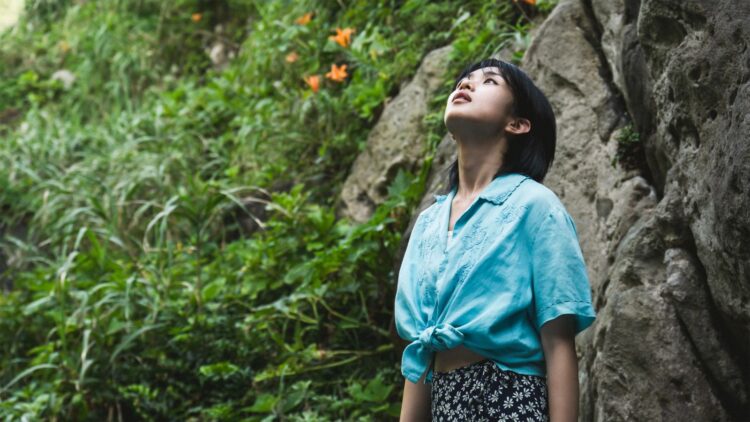
Writing about another great Locarno film a few days ago, I lamented the critical inclination to always bring up Éric Rohmer and Hong Sangsoo. Regardless, it would be wrong not to note the echoes of their work in Sho Miyake’s breathtakingly gorgeous Two Seasons, Two Strangers, a film that was awarded the Golden Leopard from a Carlos Reygadas-led jury this weekend, beating out more obviously challenging films from the likes of Ben Rivers and Alexandre Koberidze. Like Hong’s peerless Tale of Cinema, Miyake begins his latest with a film-within-the-film, allowing us the pleasure of a confected human connection before dropping us in the choppy waters of something far more real. It’s an excellent piece of work and, I think, deserving of the prize.
Two Seasons is the third in a wonderful recent run by Miyake, joining Small, Slow But Steady (2022) and All The Long Nights (2024). With each he has shown a remarkable ability for mixing porcelain-like levels of craft and detail with stories of comparatively messy human compassion––a cinematic mix that never fails to delight. Despite racking up some awards for those films, his work plays at the kind of modest register that often keeps filmmakers of his ilk relatively below-the-radar or, at the very least, just shy of name recognition. Winning the Leopard might be the push that elevates him to auteur status and perhaps (with respect to Locarno) the biggest of the big competitions, where I feel he belongs.
“Scene 1, Summer, Seaside.” Or so goes the opening text written by Li (Shim Eun-kyung), a lonely screenwriter. She is writing the film that Miyake promptly plunges us into: a yearning, typically Rohmerian holiday romance in which beautiful young people read paperbacks by the shore and the only thing bluer than the lapping waves are their fraught emotions. The rub, of course, is that Li’s life is nothing like this, and when Miyake finally cuts to it at around the half-hour mark, replacing those azurs with more sullen browns, we’re left acutely aware that something’s missing. We see her suffer the mild ignominy of a Q&A where her director does most of the talking. We then see her attend her professor’s funeral. Moved by these events and perhaps tired of dreaming up other people’s adventures, she decides to go out and find one of her own.
Two Seasons is an adaptation of Mr. Ben and His Igloo, A View of the Seaside by Yoshiharu Tsuge, a writer and artist who’s been called the Japanese Robert Crumb––not least his 1960s output, which is regarded as some of the first autobiographical work in comics. I can’t say I’ve ever read them, but a cursory glance is enough to suggest that Miyake isn’t attempting to recreate his visual style as much as Tsuge’s spirit. Yet the level of aching perfection in Miyake’s image-making does, I believe, warrant comparisons to that art form. Just look at the opening shot of Tokyo here, how the buildings seem to cascade over one another like a panel from Katsuhiro Otomo. Then there’s the endearing way Li’s glasses fog up after a big slurp of ramen and the play of light on her bedroom wall as a train rattles by at night––a moment so lo-fi hip hop radio beats-coded you barely stop to think how hard it would be to sleep there.
Then there’s the other remarkable train shot in this film, which goes from pitch-black to dazzling white as the camera curves its way through a darkened tunnel to discover a world of untouched snow. This is the landscape into which Li travels on her side quest, making unlikely friends with a crotchety innkeeper, Benzo (Shinichi Tsutsumi), and even helping him steal a pricy fish from his ex’s koi pond. That such a wild tonal shift arrives so late is nothing if not a choice by Miyake: Two Seasons is the rare film that begins with mundane clarity (remember, “scene 1, summer, seaside”) and works its way back, leaving you with the knottier stuff of life. Along the way, Li remembers what it’s like to have fun; the movie dutifully follows her lead.
Two Seasons, Two Strangers premiered at the 2025 Locarno Film Festival.
The post Locarno Review: Golden Leopard-Winning Two Seasons, Two Strangers Is Breathtakingly Gorgeous first appeared on The Film Stage.
from The Film Stage https://ift.tt/iVtrumS


0 Comments